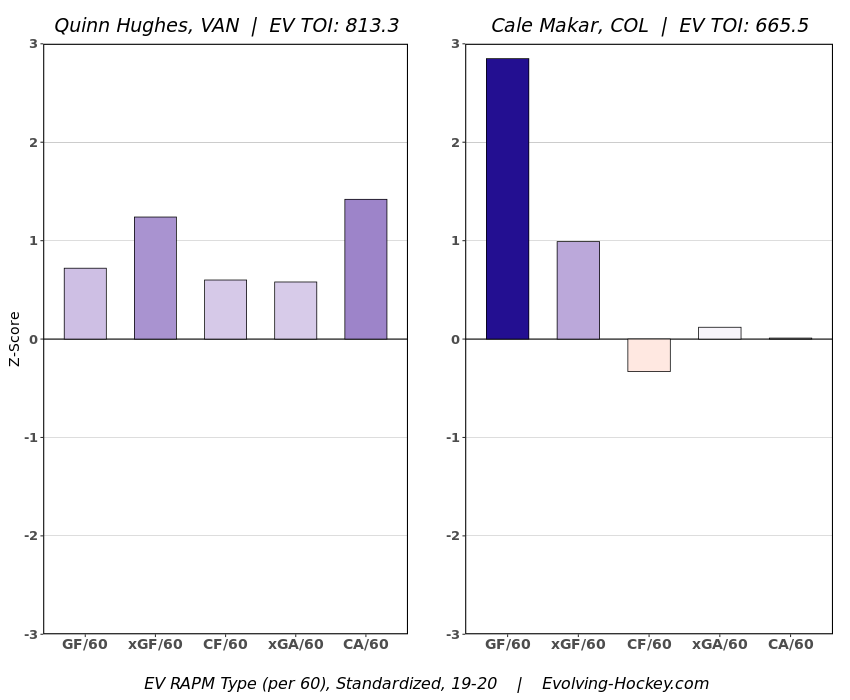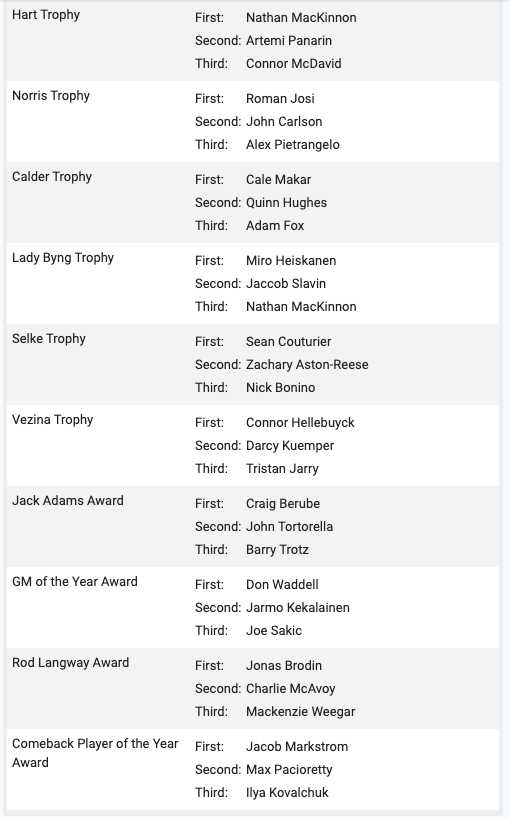Quinn Hughes is having a phenomenal rookie season. At just 20 years old, he's already heading to his first All-Star Game as one of the best defencemen in the Pacific Division. He also leads all rookies in ice time and is first in power play points, as he's quickly stepped into a role as the quarterback on the Canucks' first power play unit.
It's not enough.
At least, it's not enough for the Professional Hockey Writers Association (PHWA), which votes on the Calder Trophy award for the NHL's rookie of the year. In the mid-season awards, voted on by the PHWA over the last week, Hughes finished second to Cale Makar in the Calder Trophy vote, just ahead of Victor Olofsson.
Not satisfied just with knowing the final placement, I reached out to Frank Seravalli, President of the PHWA, to find out how close it was.
"It was a landslide," said Seravalli. "Makar was the most lopsided award winner. He generated 101 first place votes out of 117 ballots."
That's certainly understandable. Hughes is second in rookie scorring behind Cale Makar and Victor Olofsson, with 34 points in 48 games. In seven fewer games, Makar has 37 points.
Makar also has more than twice as many goals as Hughes, 11 to Hughes's 5. That has Makar in the top-10 among NHL defencemen in goalscoring. He's scored some pretty goals this season, using his great hands and quick release to undress defenders and make goaltenders look helpless.
Hughes, on the other hand, has other talents. While he has a better shot than many expected, his primary contribution is distribution. Hughes is sixth among NHL defencemen in assists and his ability to jump down the boards with his elite skating can throw opposing teams into disarray, opening up passing lanes to create scoring chances.
There's an argument to be made that Hughes is more essential to his team's success than Makar. After all, Hughes plays more and tougher minutes than Makar, regularly used in a match-up role against the opposing team's top forwards.
If you ascribe to analytics, there are some other arguments to be made in favour of Hughes. We can look at Regularized Adjusted Plus-Minus (RAPM) charts from Evolving-Hockey to compare Hughes to Makar directly and see that Hughes has had a more balanced impact on the Canucks, while Makar's impact is skewed heavily towards the offensive end of the ice.
 RAPM Chart from Evolving-Hockey comparing Quinn Hughes to Cale Makar.
RAPM Chart from Evolving-Hockey comparing Quinn Hughes to Cale Makar.You could even look at this chart and point out that Makar's impact on goal production (GF/60) far out-paces his expected impact (xGF/60). That might suggest a certain amount of luck for Makar, who leads all NHL defencemen in shooting percentage at 12.8%. If his shooting percentage comes back down to earth, so will his goalscoring.
Of course, none of that matters if Makar keeps racking up points. He's currently on-pace for 66 points in 73 games this season, which would tie Phil Housley for the fourth-best season from a rookie defenceman of all time and would make him the first rookie defenceman in 34 years to get more than 60 points.
If Makar comes even close to that, he'll be nearly impossible to beat for the Calder Trophy. As much as other factors carry some weight, points still reign supreme when it comes to awards.
That means, if the Canucks want to have back-to-back Calder winners, Hughes will need to amp up his point production in the second half of the season. Key to that will be sorting out the power play issues that have caused a cold streak in recent weeks.
Of course, the Canucks would probably just rather make the playoffs rather than worrying about an individual award, and Hughes is already contributing plenty towards that goal.
Here are the complete results of the mid-season awards from the PHWA, which includes some non-traditional awards like the Rod Langway and Comeback Player of the Year:
Hart Trophy - to the player adjudged to be most valuable to his team.
1. Connor McDavid, Edmonton Oilers
2. Nathan MacKinnon, Colorado Avalanche
3. David Pastrnak, Boston Bruins
Norris Trophy - to the defenseman who demonstrates the greatest all-round ability in the position.
1. John Carlson, Washington Capitals
2. Roman Josi, Nashville Predators
3. Dougie Hamilton, Carolina Hurricanes
Selke Trophy - to the forward who best excels in the defensive aspects of the game.
1. Sean Couturier, Philadelphia Flyers
2. Patrice Bergeron, Boston Bruins
3. Ryan O’Reilly, St. Louis Blues
Calder Trophy - to the player selected as the most proficient in his first year of competition.
1. Cale Makar, Colorado Avalanche
2. Quinn Hughes, Vancouver Canucks
3. Victor Olofsson, Buffalo Sabres
Lady Byng Trophy - to the player adjudged to have exhibited the best type of sportsmanship and gentlemanly conduct combined with a high standard of playing ability.
1. Nathan MacKinnon, Colorado Avalanche
2. Auston Matthews, Toronto Maple Leafs
3. Ryan O’Reilly, St. Louis Blues
Vezina Trophy - to the goaltender adjudged to be the best at his position.
1. Connor Hellebuyck, Winnipeg Jets
2. Ben Bishop, Dallas Stars
3. Darcy Kuemper, Arizona Coyotes
Jack Adams Award - to the coach adjudged to have contributed the most to his team's success.
1. Mike Sullivan, Pittsburgh Penguins
2. John Tortorella, Columbus Blue Jackets
3. Craig Berube, St. Louis Blues
Jim Gregory GM of the Year Award - to the General Manager adjusted to have contributed most to his team's success.
1. Joe Sakic, Colorado Avalanche
2. John Chayka, Arizona Coyotes
3. Doug Armstrong, St. Louis Blues
Rod Langway Award - to the defenseman who best excels in the defensive aspect of the game.
1. Jaccob Slavin, Carolina Hurricanes
2. Victor Hedman, Tampa Bay Lightning
3. Roman Josi, Nashville Predators
Comeback Player of the Year Award - to the player who returned to a previous high level ofperformance that was interrupted by subpar play, long-term injury or major illness.
1. William Nylander, Toronto Maple Leafs
2. Anthony Duclair, Ottawa Senators
3. Max Pacioretty, Vegas Golden Knights
In the interests of transparency, here is my ballot. As a new member of the PHWA this season, this was my first time voting for the mid-season awards:
 Daniel Wagner's ballot for the NHL's PHWA mid-season awards.
Daniel Wagner's ballot for the NHL's PHWA mid-season awards.



